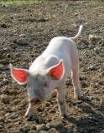Four examples of idea generation
Problem-focused questions are a good start for idea generation. These can relate to quite general considerations or be specific to particular problems. In this section, we present some questions related to the four previously introduced examples of food trends:
Convenience: pork-based snacks on the go?
As pointed out previously, convenience refers to time and effort spent in various activities. Hence, two general questions could be asked:
- How can consumers be satisfied by saving time for food shopping, preparation, consumption and/or disposal in their daily life?
- How can consumers be satisfied by reducing effort during food shopping, preparation, consumption and/or disposal in their daily life?
We can also narrow down our focus to ask what pork-based snacks could be offered. There is a trend in society towards eating out and consuming snacks between business meetings, while going shopping etc.
- What 'ready-to-eat' products (meals, snacks etc.) could be developed for consumers? What requirements do such products have that make them attractive to consume while on the go?

Health: reducing salt or adding nutrients?
Consumers want to follow a healthy diet, but often fail. When it comes to the health-giving properties of pork meat, we find diverging points of view among not only consumers, but also dieticians and other professionals. One major issue here is the considerable sodium or salt content in pork meat. The related question is therefore:
- How can salt be reduced in pork products?
Another trend is to add nutrients to pork products - functional foods. This approach (in contrast or in addition to reducing unhealthy elements) is becoming more and more popular. The increase in polyunsaturated fatty acids (PUFAs) such as omega-3 is a concrete example of ongoing research.

Animal welfare: masking boar taint?
Castration of pigs is standard practice in most countries. The most common technique for castration is surgical castration without painkillers at 1-3 weeks of age. As part of the PIGCAS research project ( on attitudes, practices and state of pig castration in Europe), a team of European scientists has demonstrated that, of the 125 million male pigs slaughtered each year in Europe, 77% are castrated without anaesthetic (Fredriksen et al., 2009).
There is substantial evidence that castration is painful and highly aversive to pigs and so it is a significant welfare concern and a procedure that will not be accepted in the future. The reason for castration is that the meat from some entire male pigs has an unpleasant taint or odour, so called 'boar taint'.
How can we make products that take animal welfare into consideration? Can we mask the unpleasant taint or odour in new products?

Sustainability:
The issue of sustainability can be approached by various means. In particular, land use for livestock and feed production, water use, and energy management in production and processing are challenges, but also opportunities for the industry. Meat consumption has become a major topic in public discussion. So what can we do about it?
- Offer smaller portions?
- Move towards production and processing standards with zero carbon emissions?
It is clear that sustainability affects the whole production chain of the industry rather than specific pork products themselves. This link can be established, however, by communicating effectively to consumers and other stakeholders the efforts that are actually being made today and where development is heading. Whether you take a proactive or a passive role in this discussion is up to you. But you might already know what is the best position to take ...
